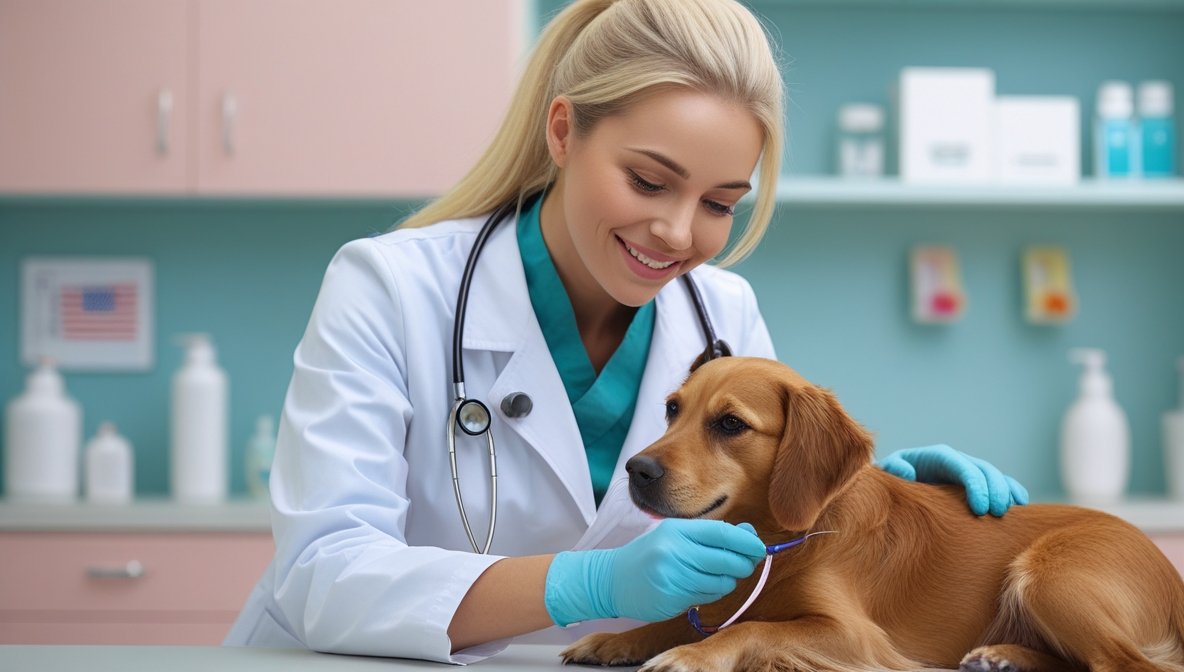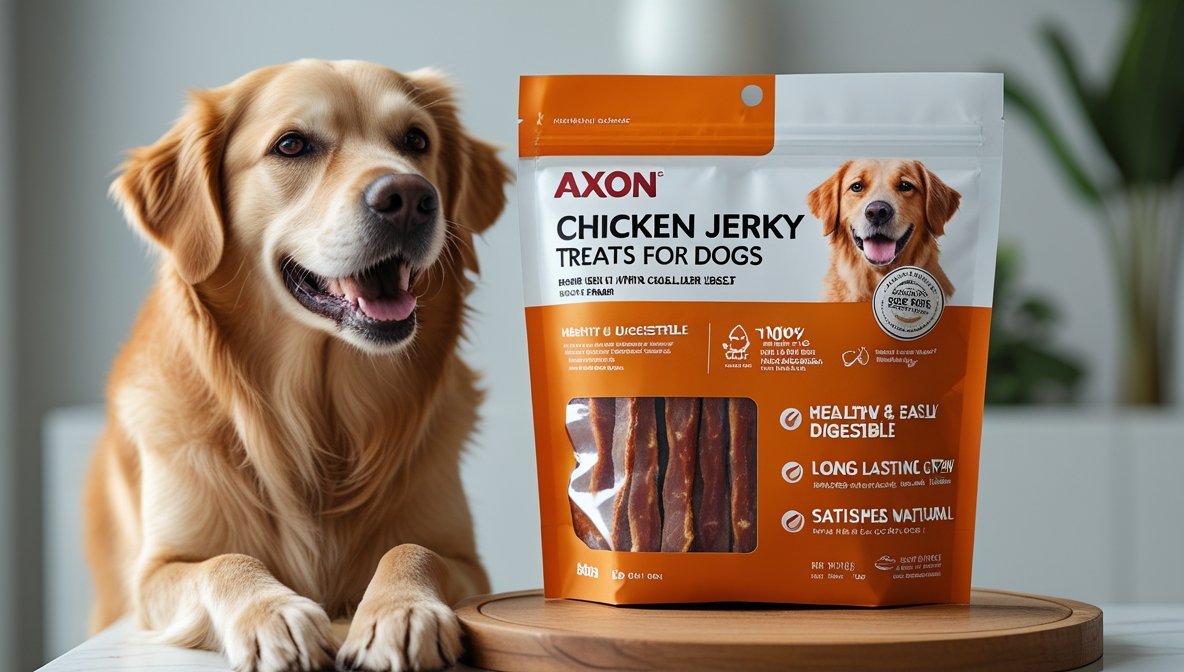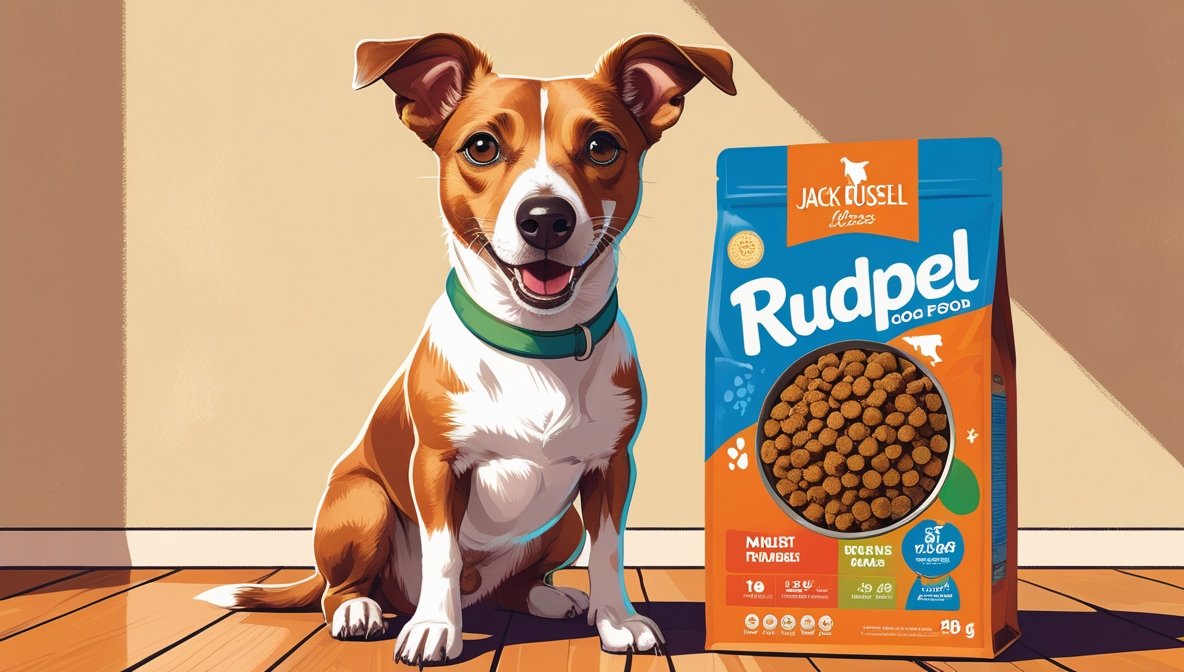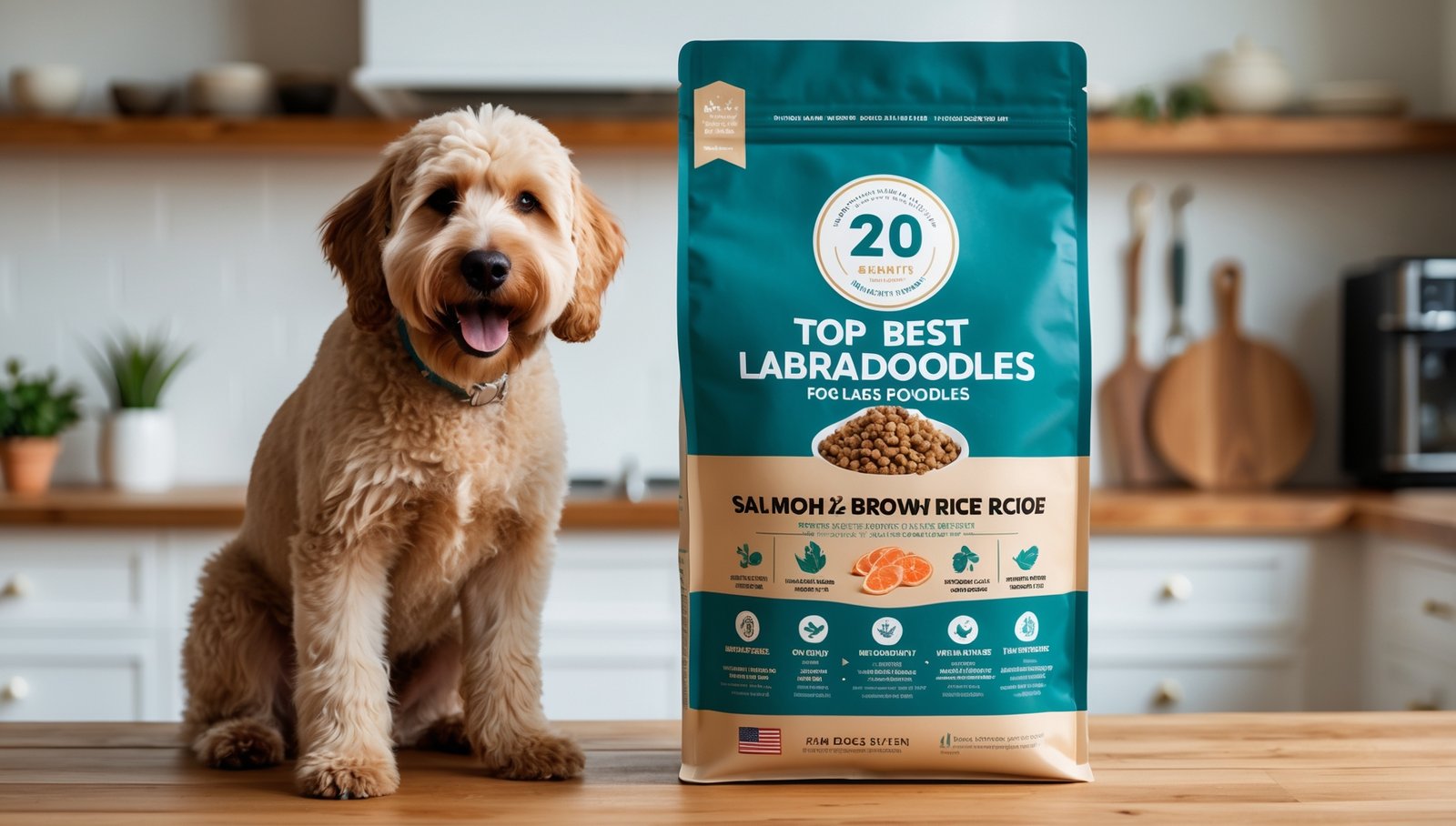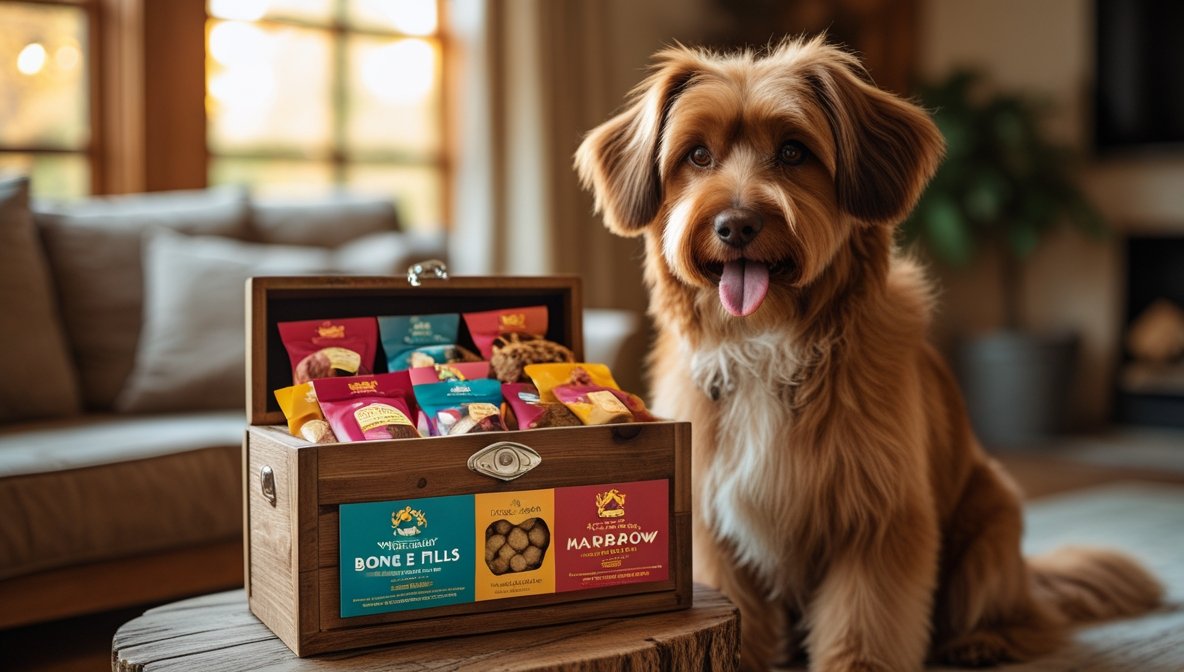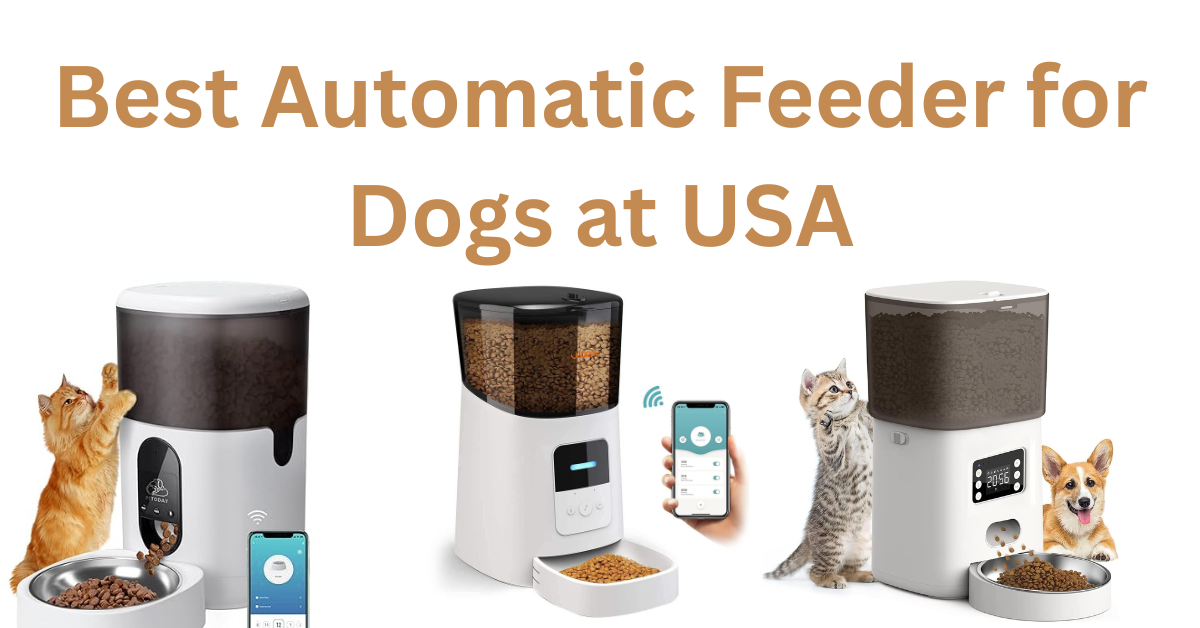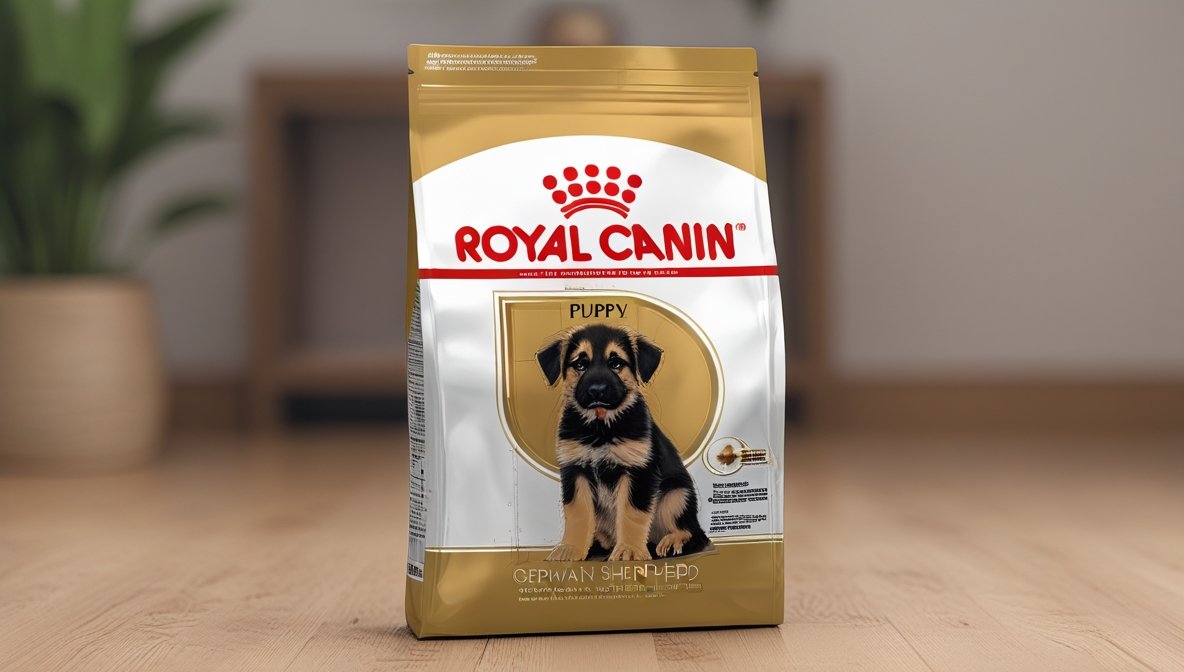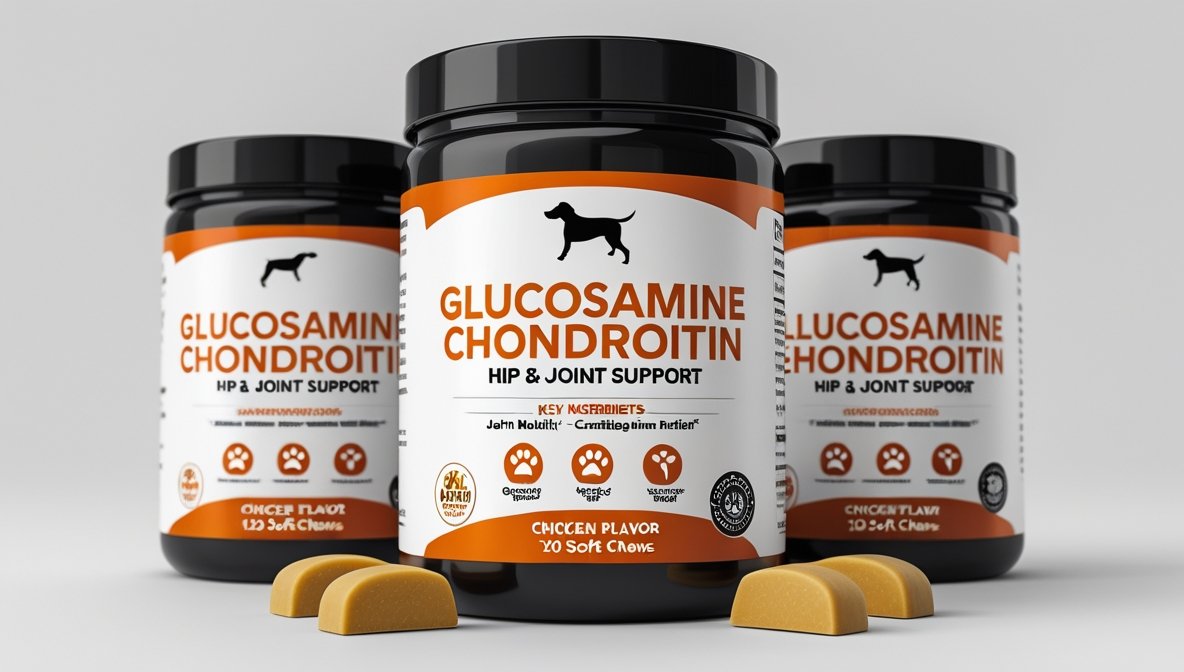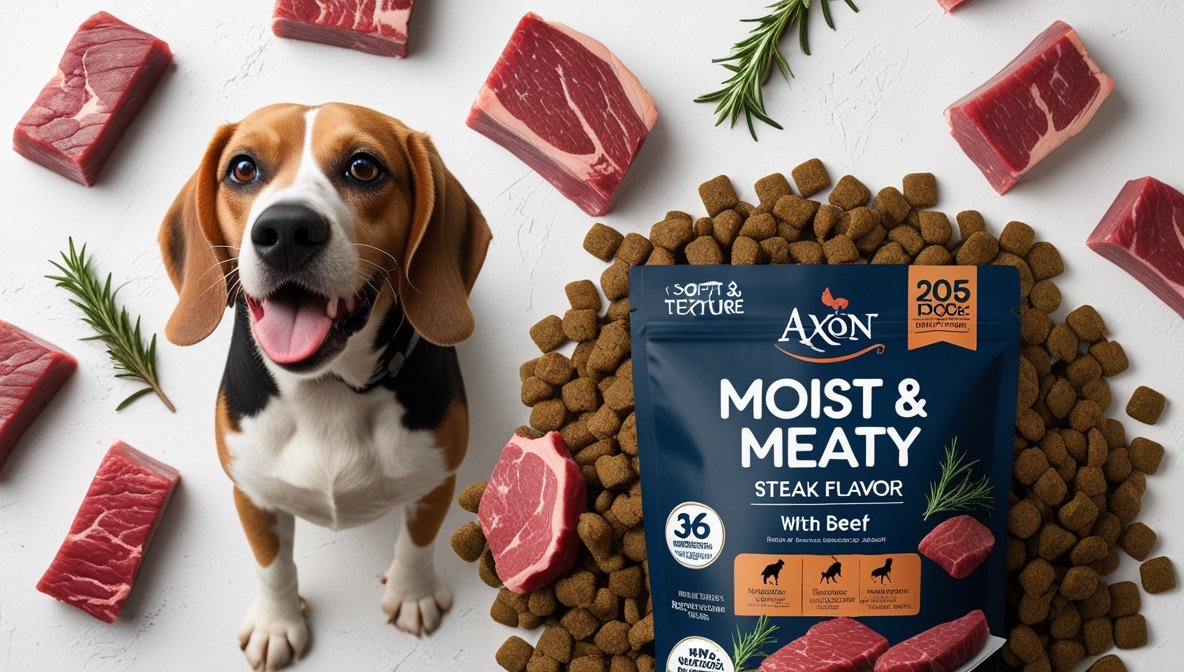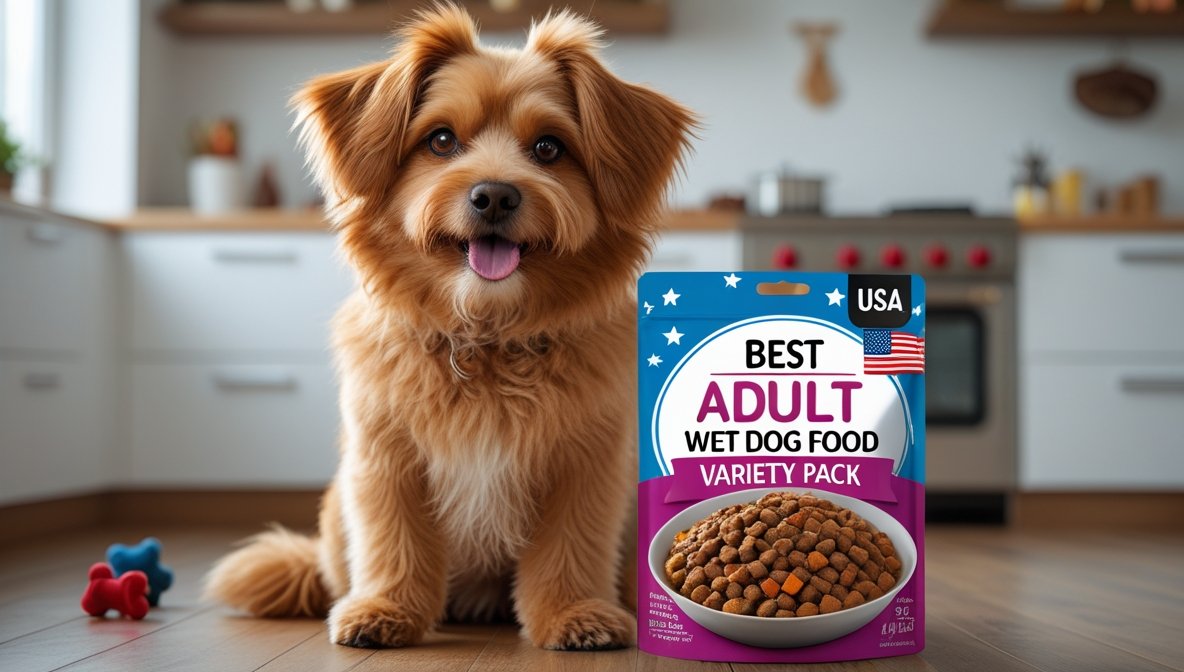Discover the best dog food for German Shepherds in the USA and learn how to pick top-quality nutrition for every life stage. German Shepherds are large, active working dogs, so their diets must fuel high energy, support joint health, and keep their coat and digestive system healthy. This guide covers everything from puppy to senior diets, including dry, wet, and fresh food options, as well as special formulas for sensitive stomachs and allergies. We also explain key nutrients (protein, fats, etc.), expert feeding tips, and how to consult veterinary nutritionists. With research-backed recommendations and 2025 updates, you’ll find the perfect meal plan to keep your German Shepherd thriving best dog food for german shepherds.
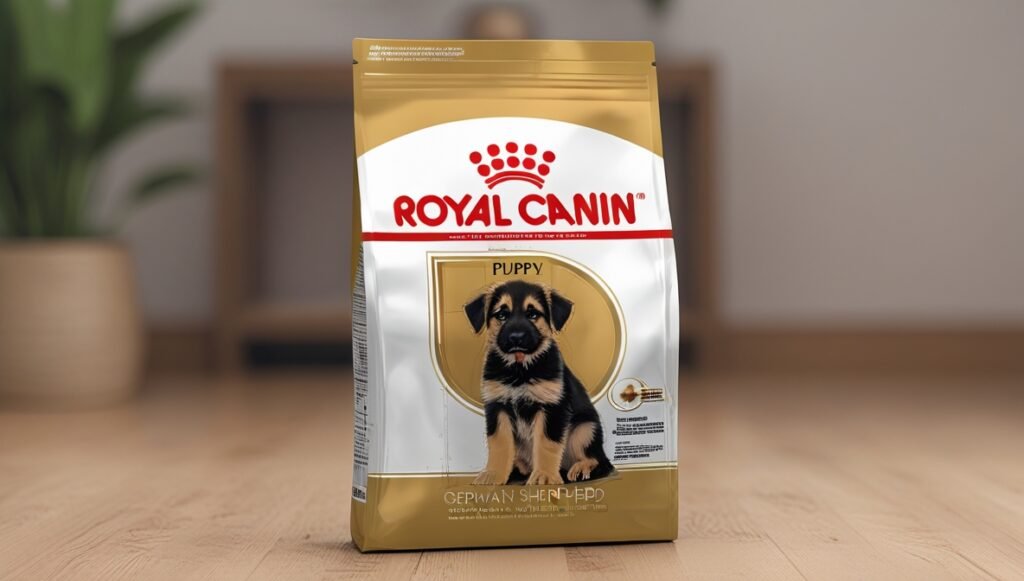
Table of Contents
Figure: A German Shepherd dog resting in an outdoor yard (photo by Summer Stock via Pexels). German Shepherds are large (males 65–90 lbs, females 50–70 lbs) and muscular. Originally bred for herding and later used by police and military, they are loyal, intelligent, and highly active. Their nutritional needs reflect this lifestyle: they benefit from high-quality protein to maintain muscle, healthy fats (like omega-3) for a shiny coat and joints, and complex carbohydrates or fiber for sustained energy and digestion. Because GSDs often face issues like hip dysplasia and arthritis (roughly 20% of GSDs develop hip dysplasia), diets that include joint-support nutrients (glucosamine, chondroitin, EPA/DHA) can help. They also have relatively sensitive digestion, so easily digestible ingredients and sometimes probiotics are beneficial best dog food for german shepherds.
German Shepherds mature quickly: typically a large-breed puppy formula is fed only until around 6–12 months of age to prevent overly rapid growth. Thereafter, an adult maintenance diet with balanced protein (around 18–26% of calories) and moderate fat (8–15%) is recommended. In later years (around 5+ years), many GSDs switch to a senior formula lower in calories and phosphorus, with added collagen/EPA for joint support. Throughout life, feeding plenty of high-quality food and preventing obesity are key – excess weight stresses joints and can exacerbate health problems. In short, German Shepherd food should be a complete, balanced diet tailored to large breeds: it starts with meat-based proteins as first ingredients and includes essential nutrients for bone, joint, coat, and immune health best dog food for german shepherds.
Key Nutritional Needs of German Shepherds
German Shepherds have some specific dietary requirements due to their size and activity. Protein: GSDs thrive on a protein-rich diet. Experts recommend adult diets with at least 18–26% protein (on a dry-matter basis), and even higher (around 22% or more) for large-breed working dogs. Puppies need more protein (around 22–30%) for growth, but excess protein just converts to fat. The first ingredient should be a named meat (e.g. chicken, lamb, beef) best dog food for german shepherds.
Fats: Healthy fats provide concentrated energy and support coat and skin. Omega-3 fatty acids (from fish oil or flaxseed) help maintain a glossy coat and joint health. Royal Canin’s GSD formulas highlight EPA and DHA (fish oil) for skin and coat. Generally, adult GSD formulas contain ~10–15% fat. Higher-fat “sport” formulas (around 16–22%) can fuel very active GSDs or working dogs best dog food for german shepherds.
Carbohydrates and Fiber: While protein is primary, carbohydrates (grains or veggies) provide energy. Easily digestible grains like rice, oats, or barley can be included; some GSDs do well on grain-free carbs like potatoes or peas. Fiber (from beet pulp, veggies, etc.) supports digestion. Beet pulp, for example, is an excellent fiber source that “provides good fecal quality in dogs”. Diets for sensitive GSDs often use rice or pumpkin for gentle digestion best dog food for german shepherds.
Joint & Bone Support: Large breeds benefit from joint-protecting nutrients. Look for glucosamine and chondroitin (for cartilage health) and antioxidants for overall wellness. For example, Royal Canin’s GSD formulas include glucosamine/chondroitin and lower phosphorus (kidney support). Collagen from bone meal or additives, plus fish oil (EPA/DHA), help maintain healthy joints and bones.
Digestive Health: Many German Shepherds can be prone to digestive upset or loose stools. Highly digestible proteins and prebiotics/probiotics support a sensitive stomach. Royal Canin notes that GSDs “tend to have poor stool quality,” so their kibble uses L.I.P. proteins and fibers to balance gut flora. Similarly, Diamond Naturals Large Breed Chicken & Rice includes probiotics to help digestion, and rice as a bland carb to “soothe and support a sensitive stomach” best dog food for german shepherds.
Life Stage Nutrition: Nutrition needs change with age. Puppies require calorie-dense, controlled-calcium formulas; adults need maintenance diets; seniors need lower-calorie, nutrient-rich foods. We cover these next in detail.
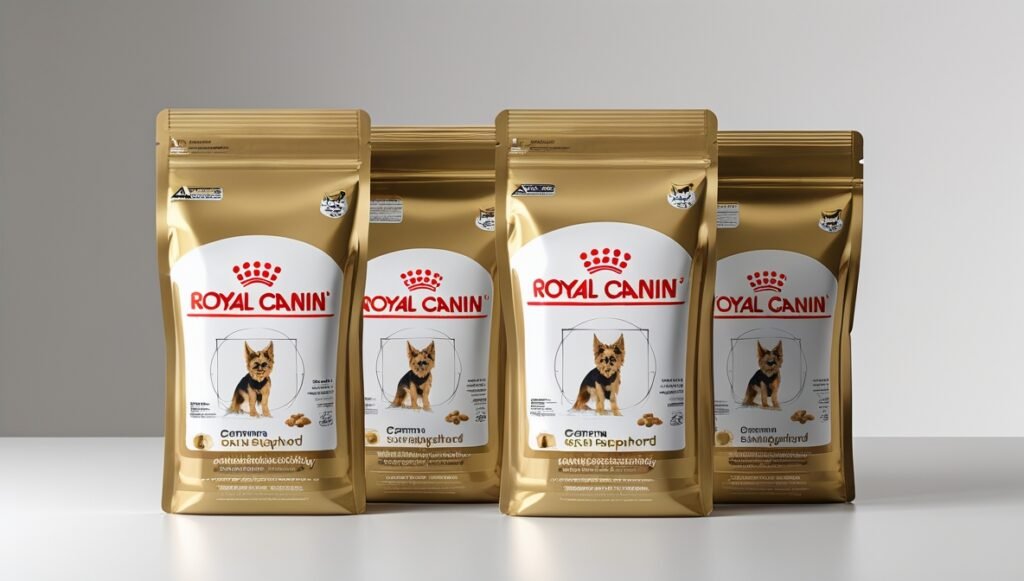
Dog Food Choice: How to Pick the Right Diet
Choosing the right dog food involves vet consultation and reading labels. Consulting a board-certified veterinary nutritionist or your vet is ideal, especially if your GSD has health issues. Look for foods that meet AAFCO standards for your dog’s life stage. As a rule, opt for “large-breed” formulas for German Shepherds, since these have balanced calcium/phosphorus and moderate calories. Purina advises that large-breed diets help “support joint health and mobility” in dogs over 50 lbs best dog food for german shepherds.
Key points for dog food choice: check that the first ingredients are meat or meat meal, not unspecified by-products or fillers. Avoid artificial preservatives (like BHA/BHT) and overly high fat (unless recommended for working dogs). Prefer foods with named proteins (chicken, lamb, etc.) and whole grains or wholesome carbohydrates. For example, Taste of the Wild Southwest Canyon dry food (a popular pick) uses beef, lamb meal, and wild boar, with natural preservatives and no BHA/BHT. In general, a healthy recipe will list proteins first, followed by wholesome grains or vegetables, then fats and fibers best dog food for german shepherds.
Feeding guidelines: German Shepherds usually eat 2–3 meals per day (puppies 3-4x daily, adults 2x). Monitor weight and body condition; adjust portions to prevent obesity. The NRC estimates a 60–90 lb GSD needs ~1,272–2,100 kcal/day depending on activity. Active dogs need the higher end (1800–2100 kcal), while older or less active may need as low as 1272–1540 kcal. Always transition diets gradually over 7–10 days to avoid upset stomach best dog food for german shepherds.
If your GSD has a condition (allergies, pancreatitis, etc.), specialized diets (limited ingredient, hydrolyzed protein, etc.) may be advised by your vet. Generally, the best dog food for an active German Shepherd is one that is high in quality protein and calories – for example, Purina Pro Plan SPORT formulas (30/20 or 26/16) are formulated for athletic or working dogs best dog food for german shepherds.
Best Puppy Food for German Shepherds
German Shepherd puppies grow fast and need nutrient-dense, controlled-growth diets. Choose a large-breed puppy formula specifically – these have the right calcium/phosphorus balance to avoid skeletal issues. Look for added DHA and omega-3 (for brain and vision development) and plenty of protein (around 22% or more) for muscle growth. Vet nutrition experts caution that overfeeding protein or calories can cause puppies to grow too fast and risk bone/joint problems best dog food for german shepherds.
Trusted options often include large-breed puppy kibbles like Purina Pro Plan Large Breed Puppy, Royal Canin German Shepherd Puppy, or Hill’s Science Diet Puppy Large Breed. These formulas are balanced for growth (some Purina puppy foods contain 22% protein and 8% fat). Grain-free puppy foods are available (e.g. Merrick Puppy, Orijen Puppy), but grain-inclusive diets with moderate fat and complex carbs are usually sufficient unless your pup has an allergy best dog food for german shepherds.
Feeding frequency for GSD puppies (up to 6–8 months) is typically 3-4 meals per day to avoid hunger and bloat. Consult feeding charts based on weight, and let growth guides or vet advice determine when to switch to adult food (often around 12 months, earlier for very large pups). Remember: Puppy GSDs should not be on high-calcium puppy food beyond the recommended age, to prevent excessive bone growth.
Best Dog Food for Adult German Shepherds
Adult German Shepherds (1–7 years) need a maintenance diet that supports their activity level and body condition. A large-breed formula is ideal: it provides balanced nutrients for big dogs and often includes joint-support supplements. You should choose a food with at least 18–26% protein; some high-performance GSDs may benefit from even higher (30%+) as long as it’s lean protein. Fat content of 10–15% is typical, more for very active dogs best dog food for german shepherds.
Many breed experts recommend foods with glucosamine and chondroitin (for hip and joint health), like Blue Buffalo Wilderness or Blue Buffalo Life Protection Formula Large Breed (both high in protein and include joint supplements). Royal Canin’s German Shepherd Adult dry formula is tailored for GSDs: it contains fish oil (EPA/DHA) and glucosamine to support coat and joints. Similarly, Purina Pro Plan Large Breed and Purina One Large Breed (listed as GSD-friendly by Purina) provide balanced nutrition for adult GSDs.
Many reviewers also praise grain-free grain-inclusive options: e.g., Taste of the Wild Southwest Canyon (grain-free) has 32% protein from various meats, while Holistic Select Large & Giant Breed (grain-inclusive) offers 27% protein without “plant protein boosters”. Both contain probiotics for digestion. In general, rotate among a few high-quality brands to provide nutrient variety (diet rotation can prevent allergies) best dog food for german shepherds.
Be mindful of weight: since GSDs are prone to hip dysplasia, keeping them lean is crucial. For a more sedentary dog or one with early arthritis, switch to a formula lower in fat/calories like Royal Canin German Shepherd Adult 5+ or Purina Pro Plan Light. Always compare calorie density and adjust feeding amounts if activity changes.
Figure: A stainless-steel dog bowl filled with quality kibble – representing nutritious dry food options for large breeds like German Shepherds. Dry kibble is convenient, shelf-stable, and often the most complete balanced option. For variety and extra hydration, you can mix in wet food or toppers. Fresh and raw diets (e.g. Nom Nom, The Farmer’s Dog, Ollie) are also gaining popularity: they use human-grade ingredients and are formulated by veterinary nutritionists, with high moisture and minimal processing (e.g. Ollie’s lamb recipe is 38.5% protein, 27% fat). These fresh foods often promote coat and joint health with lean proteins, veggies and omega oils. However, they can be pricier and require refrigeration. For home-prepared meals, always follow balanced recipes from veterinary sources (consult AKC or ACVN guidelines) and include a calcium supplement best dog food for german shepherds.
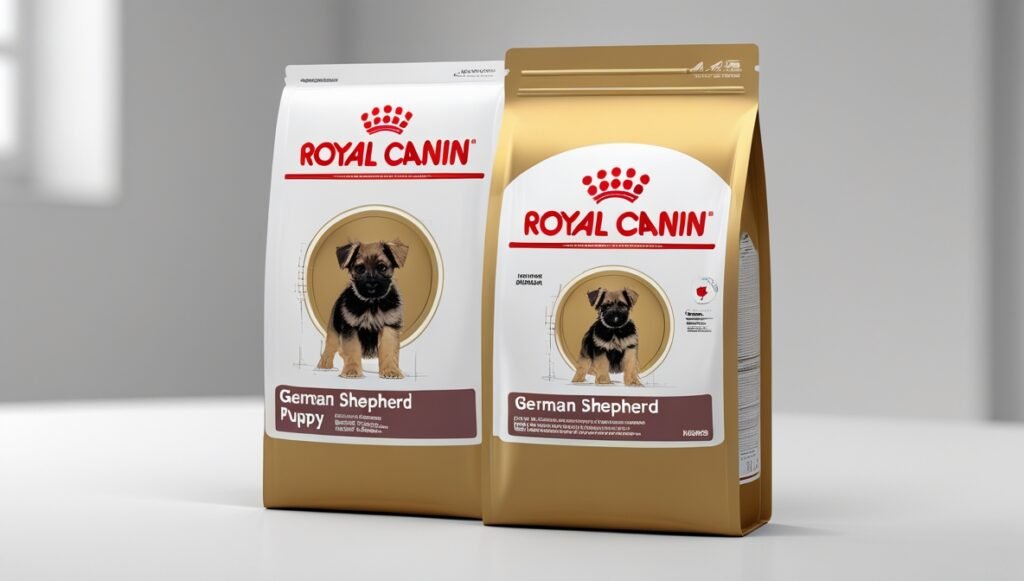
Best Dog Food for Senior German Shepherds
A German Shepherd reaches “senior” status around 5–7 years of age. Senior GSDs may slow down, so they need fewer calories and added joint and organ support. Senior formulas typically have similar protein levels but lower fat and higher fiber to control weight and digestion. They also include more glucosamine/chondroitin, antioxidants, and often lower phosphorus for kidney health best dog food for german shepherds.
For example, Royal Canin German Shepherd 5+ dry food is specifically formulated for older GSDs. It delivers collagen, EPA, and DHA to “support cartilage” and “maintain healthy bones and joints”. It also has antioxidants for aging and 14% lower phosphorus for kidney health. Highly digestible protein and added prebiotic fibers help sensitive stomachs and stool quality. Other senior options include Hill’s Science Diet Adult 7+ Large Breed and Purina Pro Plan Sensitive Skin & Stomach (which is good for older dogs with digestive issues). Blue Buffalo Life Protection Senior is another high-protein (27%) choice with glucosamine best dog food for german shepherds.
As with any senior dog, watch for joint pain: you may need to slow-ramp down fat and carbs to prevent obesity, or mix canned food for easier chewing. Always ensure access to fresh water (joint supplements like MSM or fish oil liquids can be added to meals). If kidney issues arise, veterinarians may recommend low-phosphorus or prescription diets. Otherwise, stick to a senior large-breed diet that meets AAFCO standards and is formulated for joint/bone health best dog food for german shepherds.
Food for Sensitive Stomachs and Allergies
Some German Shepherds suffer from food sensitivities or allergies. Common triggers include beef, chicken, dairy, or wheat. Also, GSDs can have sensitive digestion. If your dog vomits, has chronic diarrhea, or itchy skin, consider these options:
- Limited-Ingredient Diets: These use a single protein and one carbohydrate (e.g. lamb & rice, duck & potato) to avoid allergens. Options include Royal Canin Veterinary diet, Blue Buffalo Basics, or Merrick Limited Ingredient best dog food for german shepherds.
- Grain Choice: Contrary to popular grain-free trends, unless your GSD is truly grain-allergic, grains like brown rice and oats are fine. In fact, many vets and sources now advise caution with grain-free diets due to links to DCM. For sensitive GSDs, traditional chicken-and-rice formulas (like Diamond Naturals Large Breed Chicken & Rice) are soothing: this formula has probiotics and chelated minerals, and “chicken and rice is known for being easy on the digestive system” best dog food for german shepherds.
- Fiber & Probiotics: Foods with beet pulp or pumpkin add gentle fiber. As the AKC notes, beet pulp “provides good fecal quality” and can improve stool consistency without upsetting digestion. Many recommended GSD foods (like Blue Buffalo or Taste of the Wild) include prebiotics. Diamond Naturals and Merrick also add probiotics to support gut health best dog food for german shepherds.
- Hypoallergenic Alternatives: If a serious allergy is diagnosed, veterinary diets (Hill’s Z/D, Royal Canin Hydrolyzed) use hydrolyzed proteins or novel proteins. However, most owners try simpler solutions first. For occasional tummy upset, adding a spoonful of plain pumpkin or unflavored probiotic can help best dog food for german shepherds.
For severe skin allergies, foods like Just Food For Dogs Pantry Fresh Joint & Skin Support (a fresh, homemade diet) provide multiple sources of omega-3s and joint-supporting nutrients. In general, any formula rich in essential fatty acids and antioxidants can improve skin/coat issues.
Grain-Free vs. Grain-Inclusive Diets
Grain-free diets (containing no corn, wheat, rice, barley, etc.) became popular for pet allergies. However, recent FDA reports have linked many grain-free diets to heart disease (dilated cardiomyopathy, DCM) in dogs. In fact, “more than 90 percent of products” in DCM reports were grain-free. Many of those contained peas or lentils. While the science is still evolving, many vets now recommend caution with long-term grain-free feeding, especially for large breeds. Unless your GSD has a confirmed grain allergy, a high-quality grain-inclusive dog food is often just as nutritious best dog food for german shepherds.
Examples of good grain-inclusive choices include Orijen Original (includes oats), or the aforementioned Diamond Naturals and Holistic Select (see above). These provide whole grains plus high protein. If you do choose grain-free, ensure taurine is adequate and consider foods with added legumes or sweet potatoes. Merrick’s Grain-Free Large Breed Real Chicken & Sweet Potato is a top grain-free pick – it has 34% protein, added salmon oil for skin/coat, and probiotics. Just monitor heart health and taurine levels best dog food for german shepherds.
Consulting Veterinary Nutritionists
For personalized advice, a veterinary nutritionist can be invaluable. Board-certified veterinary nutritionists (ACVN) formulate specialized diets and can tailor recipes for your GSD’s needs. If your dog has a medical condition, ask your vet for a nutrition consult. Otherwise, most healthy GSDs can thrive on a well-chosen commercial diet. As a rule, high-quality brands often work with nutritionists – e.g., Nom Nom’s fresh foods are designed “with the help of board-certified veterinary nutritionists”. And vet-approved products like Hill’s Science Diet and Royal Canin often appear on recommended lists for German Shepherds best dog food for german shepherds.
Frequently Asked Questions of Best Dog Food for German Shepherds:
Q: What is the best dry dog food for German Shepherds?
A: A top dry kibble for GSDs should be a large-breed formula with high protein and joint supplements. Brands often recommended include Royal Canin German Shepherd Adult, Orijen Large Breed, Taste of the Wild (for GSDs) or blue Buffalo Wilderness. For example, Taste of the Wild Southwest Canyon dry food uses fresh beef and lamb, is grain-free, and has no BHA/BHT. Royal Canin’s GSD kibbles have glucosamine/chondroitin, fish oil (EPA/DHA), and tailored fiber for digestion. Always compare labels to match your dog’s needs.
Q: What about wet or fresh food?
A: Wet or fresh dog foods (like Ollie, Nom Nom, The Farmer’s Dog) can be excellent for variety and hydration. Ollie’s Lamb with Cranberries, for instance, provides 38.5% protein (lean lamb) plus healthy fats and fiber. These foods are gently cooked, human-grade, and often come with added omegas and supplements. Wet foods are also good for pickier eaters or adding moisture to dry kibble. Just ensure any fresh diet is balanced and complete (the companies above are formulated to be complete) best dog food for german shepherds.
Q: What’s the best food for an adult German Shepherd?
A: For adults, choose a large-breed maintenance diet. Good examples: Purina Pro Plan Large Breed Chicken & Rice, Blue Buffalo Large Breed Formula, and Orijen Large Breed. Royal Canin’s GSD Adult is tailored for ages 15 mo+. These have balanced protein/fat and nutrients for joint/coat health. Adjust quantity to keep your dog at an ideal weight (consult a vet if overweight) best dog food for german shepherds.
Q: What about senior German Shepherds?
A: Senior GSDs (>5–7 yrs) do best on diets formulated for older dogs. Look for senior recipes with joint support and lower calories. Royal Canin German Shepherd 5+ (discussed above) is designed for GSDs 5+, with collagen and reduced phosphorus. Other good choices include Hill’s Science Diet 7+ Large Breed Senior and Blue Buffalo Life Protection Senior Large Breed. Ensure protein stays high enough for muscle mass, but reduce fat/carbs to prevent weight gain.
Q: Grain-free or not?
A: Unless your GSD has a proven allergy, grain-inclusive diets are generally fine. Grain-free diets have been linked to heart disease (DCM) in some dogs, so use them only if needed. Many vets suggest whole grains or wholesome carbs (rice, oats, barley) instead. If using grain-free, pick formulas with added taurine or legumes, and monitor your dog’s heart health best dog food for german shepherds.
Q: How do I pick food for a sensitive German Shepherd?
A: For sensitive stomachs, start with bland, easily digestible diets. Purina Pro Plan Sensitive Skin & Stomach and Royal Canin Digestive Care are vet-recommended. At home, chicken-and-rice combos or pumpkin additives help. Diamond Naturals Chicken & Rice includes probiotics and is known for gentle digestion. Fiber sources like beet pulp (a prebiotic fiber) can normalize stools. If allergies are suspected, try a limited-ingredient diet with a novel protein (lamb, duck, fish) or a hydrolyzed prescription diet, under vet guidance best dog food for german shepherds.
Q: What do veterinary nutritionists suggest for GSDs?
A: Veterinary nutritionists emphasize balanced diets with appropriate protein and joint support. They often recommend feeding high-quality protein (not just by-products), moderate calories, and supplements like omega-3s. Many brands now work with nutritionists – for instance, Nom Nom’s fresh diets were crafted by board-certified nutritionists. Ultimately, they advise choosing AAFCO-approved diets for your dog’s life stage and monitoring health, rather than any single “miracle” ingredient best dog food for german shepherds.
By following these guidelines and choosing from the recommended foods above, you’ll provide a best-in-class diet for your German Shepherd. Proper nutrition helps prevent health issues and keeps your GSD at peak performance. What’s your favorite German Shepherd food? Share your experiences or questions below, and consider sharing this guide with other GSD owners on social media to help them find the right diet too best dog food for german shepherds.
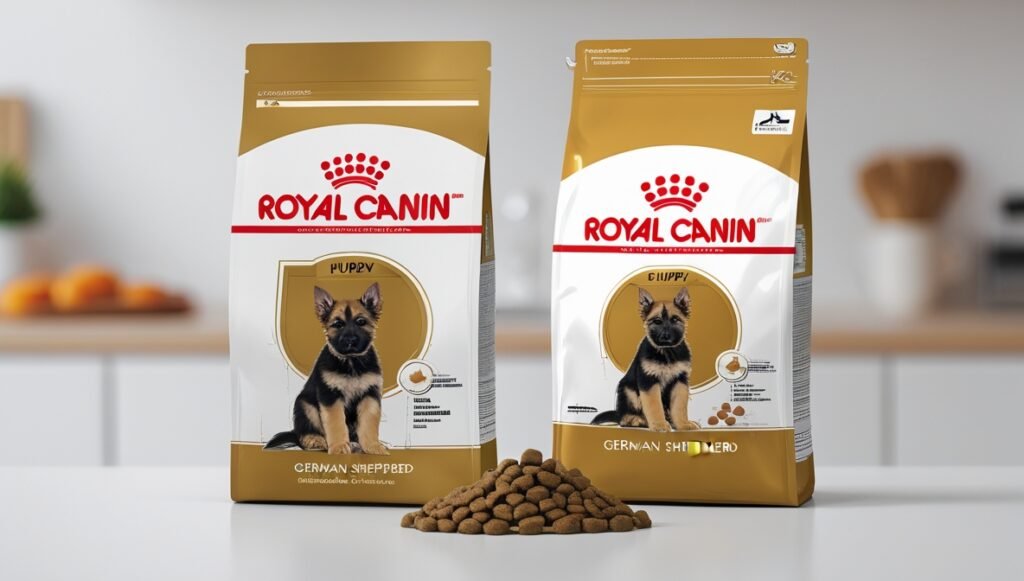
Sources: Authoritative breed and nutrition sources, including Purina and VCA breed guides, PetCareRx canine nutrition advice, published dog food reviews, and FDA reports were used to ensure accurate, up-to-date information.

